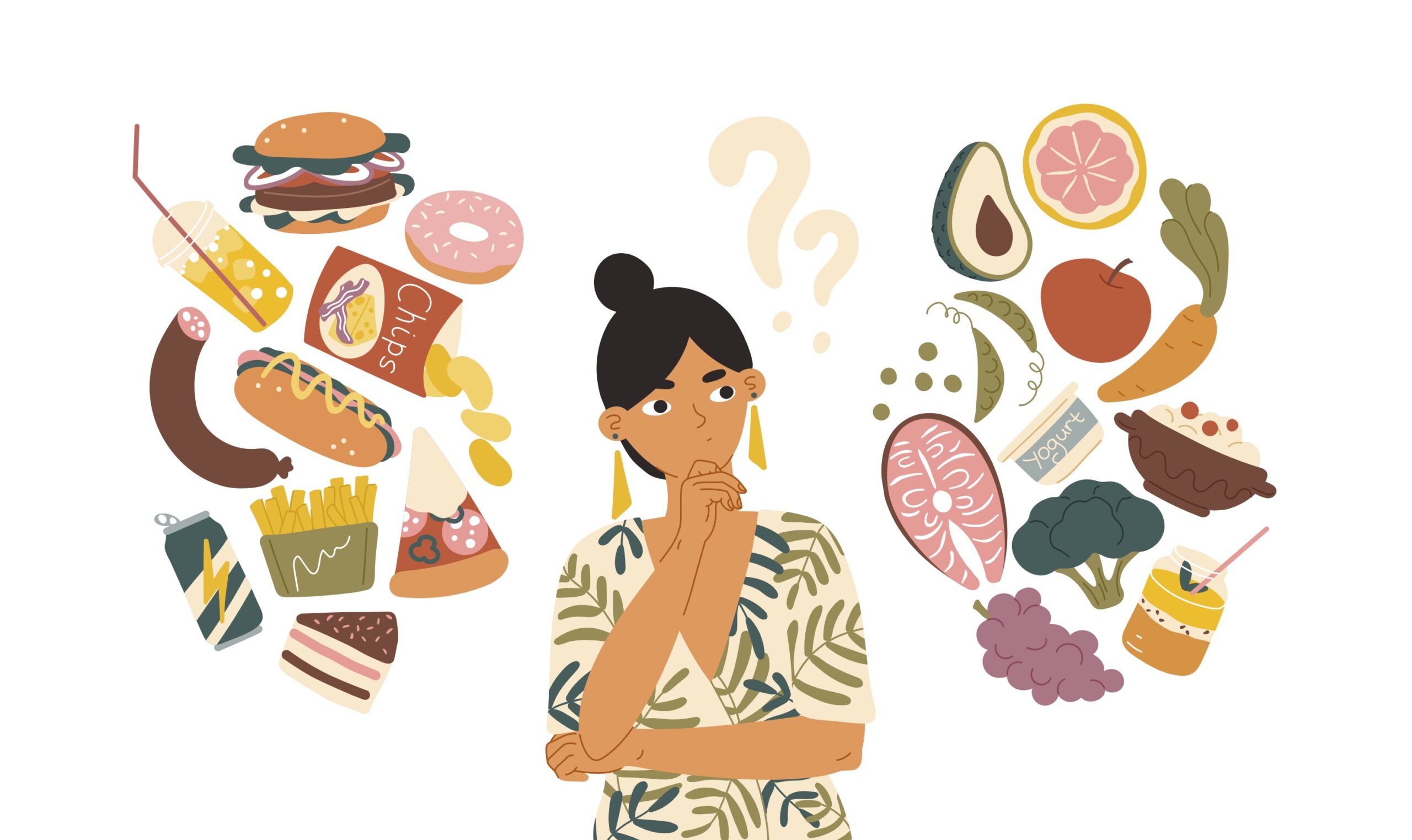Healthy eating is a good thing… right? Absolutely! But, it can go too far.
In today’s blog, we’re going to dig into when healthy eating becomes a problem, and the consequences that can have for athletes.
Interested in learning about everyday nutrition for when you’re not training? Learn more here.
When does “healthy eating” become a problem?
I was recently invited to guest lecture for a colleague’s Sports Psychology class. The students were learning about Relative Energy Deficiency in Sport, known as RED-S.
They were discussing the IOC RED-S consensus statement, and we had such a great dialogue about RED-S.
Here at BeFueled, we are really passionate about this topic because RED-S can happen to anyone; it doesn’t discriminate. Even non-athletes can struggle with this. In fact, we love to educate on this topic so much that we published a blog about it, which you can read more about here.
RED-S is caused by undereating and may overlap with an eating disorder or patterns of disordered eating. Having an eating disorder or disordered eating may place you at a higher risk for developing RED-S.
One concept I really like to dig into is the fact that disordered eating is so common. However, disordered eating patterns don’t necessarily mean an eating disorder exists.
Are you ready to ditch diet culture and start properly fueling your body for your sport? Check out our blog on “Is Intuitive Eating Right for Athletes?”
Disordered eating vs eating disorders

As I was talking about this, a student raised their hand and asked “when does eating healthy become a problem?” This was such a great question! Eating healthy, nutritious foods is no doubt important to supporting your active lifestyle, but can it become a problem?
This is what we want to dig into in this month’s blog …
Healthy eating can become problematic when …
- It’s all consuming: Meaning that eating healthily takes over and consumes your waking thoughts. All you’re thinking about is food and getting it “perfect” or “right”, and not about how what you’re consuming is benefiting what your body needs.
- Difficulty eating in social settings: You have trouble eating in social situations because you’ve established a certain group or subset of foods or specific meals to feel “right” or “safe” to eat. This is also where you might find yourself completely eliminating a certain food group or type of food (we see carbs and sugar getting vilified a lot, for example.)
- Repetitiveness: You eat the same thing over and over because you’re fearful of eating foods that aren’t deemed “healthy”. If you struggle here, you also may struggle when dining out with friends or traveling, too.
- Not honoring your cues: You ignore your body’s cues on hunger, fatigue, etc. because they don’t fit with your perspective on what you “should” be eating.
- Strained relationships: Your friendships and relationships become strained by your behaviors around food, and you feel critical of others’ food choices that don’t align with your version of what you deem “healthy”.
- Obsessive checking: You find yourself obsessively checking every label and nutrition facts on everything before you throw it into your cart at the grocery store.
- Moral feelings around food: You feel emotional distress, anxiety or a decreased sense of self worth when you eat something that is not “healthy”.
Why is this “healthy eating” a problem?
When you become obsessed with the idea of eating healthy, you become so rigid with thinking and eating that it actually begins to sabotage your performance (and your mindset and mental well being).
In our 1:1 nutrition coaching, we encourage healthy eating habits and behaviors, but not at the expense of your mental and physical health.
What happens when you can’t have the perfect “conditions” for eating? The “perfect” choice? … Do you feel anxious? Do you feel the need to compensate with exercise or drastically make changes to your nutrition the next day?
If you’re nodding your head, you could be doing the opposite of what you intended. Here are some reasons obsessive healthy eating can be a problem:
Under-eating
When these behaviors happen, we see athletes creating a situation where they are under-eating and/or creating energy deficits during their day that hurt their health and performance.
It’s important to remember that your body requires enough total food first and foremost to thrive and maintain energy availability. In fact, your body has a resting metabolic rate (RMR). This is a certain amount of calories that your body requires in order to function (like circulating your blood, perfusing your brain, and maintaining your vital organs) at rest.
Think of needing gasoline in your tank just for your car to sit idling. This is your RMR, which actually represents far more than the 1,200 calories a day. Don’t listen to the many online and popular resources that recommend this as an appropriate amount of calories … and your RMR is BEFORE you add activity in the mix!
Vitamin & mineral deficiencies
Your body also requires a variety of foods. If you’re stuck eating the same 5-10 things exclusively, you are likely missing out on vitamins and minerals that help support every single process in your body.
Not to mention, variety is the spice of life! It’s BORING to eat the same 5-10 things, and food should be something you enjoy. Fueling your body properly can be a positive and healthy experience without being restrictive or unpleasant.
Unfortunately, oftentimes healthy eating begins to become problematic when a lack of awareness of the topics we spoke about above (like low energy availability and RED-S) leads to some or all of the behaviors that we listed.
While disordered eating and eating disorders aren’t the same thing, one can lead to the other if it is not addressed.
We started this blog with a question- “when does healthy eating become a problem?”, so we will end it with another question that was posed to us.
“How do I stop if I am experiencing unhealthy behaviors around healthy foods?”
First, be aware. If you know that this is happening, or you found yourself agreeing with some of the feelings or behaviors we listed above, you might be developing an unhealthy mindset.
Since 1998, the term orthorexia has been used to describe this unhealthy obsession with healthy eating, and though it is not currently a formally recognized disorder in the Diagnostic and Statistical Manual, awareness around orthorexia continues to grow. (Neda.org)
Knowledge is power, and being aware of the distinction between healthy eating and what healthy means to you can help you to identify whether you might be tipping on to the unhealthy side of the line. Then, you can address it before you begin to experience adverse mental or physical effects.
Most importantly, if you feel that this topic resonates deeply with you, and you aren’t sure where to begin to address your behaviors around healthy eating, seek out help with a Registered Dietitian.
We also highly recommend anyone struggling with disordered behaviors around healthy eating to connect with a therapist. While not always the case, there may be underlying causes for these behaviors that could benefit from behavioral therapeutic intervention.
The takeaway
Disordered eating is so common among athletes and non athletes. That’s why at BeFueled, we find it important to educate on when healthy eating becomes a problem, and how that can impact athletes.
A few signs that healthy eating has gone too far include food feel all consuming, difficulty eating is social settings, ignoring your body’s cues, and more.
Why is it a problem? It’s problematic because it can lead to under-fueling, which can progress to RED-S, and potential vitamin and nutrient deficiencies.
If you or someone you know is struggling with disordered eating or an eating disorder, reach out for help. Qualified dietitians and therapists are here for you.
At BeFueled, we offer 1:1 nutrition coaching, where we encourage healthy eating habits and behaviors, but not at the expense of your mental and physical health.






